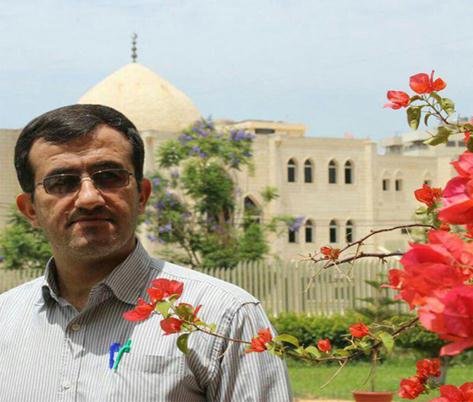Memory Writing Road Is Slippery, Please Be Careful!
Hamid Ghazvini
Translated by Ruhollah Golmoradi
2018-9-22
One of the harm that has always threatened profession of memory writing and oral history is simplistic and carelessly approach to "interview" as the most fundamental part of oral history.
In recent years, with growth of mass media and expansion of cyberspace and increasing interest in historical subjects, we are witnessing activity of the media (written and digital) that through poorly conducted interviews, which apparently are aimed at disseminating unconsidered or less-known memories and information about contemporary history, a wave of misleading, sometimes incorrect and inaccurate contents leads to minds and eyes of the audience.

These interviews often suffer from a variety of injuries, due to scientific and professional weakness of interviewers. For example, sometimes after passing time and variety of events, the narrator mistakes unconsciously in chronology or exact expression of a memory that the interviewer must make him realize about his/her mistake, and because he/she lacks the least information in that field skirt around subject and neglect a gross error; it results in creating a misleading and incorrect document that if no one notice it, it will have irreversible consequences and if they recognize the narrator's error, they would surely have an incorrect judgment about him/her and all his/her narratives.
Also, in some cases because of weak memory of the narrator, many memories are forgotten that the interviewer should help him/her, but ignorance and inability of the interviewer prevents doing so.
In addition, we often see some questions that are basically false and distort the narrator and audience. For example, it is asked, "How was Mr. X behavior with Marxist groups in the Qasr prison?" While the person was not in prison at the time and the narrator had been with him in another prison. Or it is said, "Why was Mr. X in opposition group regarding to story of investigating lack of competence of Abolhasan Bani-Sadr?" while the referred person was not at that time in Parliamentary at all. Or it is asked, "Why was commander of X military command opposed to X operation?" while the person at that time did not have such a responsibility and served elsewhere.
In fact, such mistakes indicate a simplistic look at interview and lack of accountability in producing a historical document.
Interestingly, the same people in their interviews discuss issues and events from the past that in many of them irresponsibility are criticized and reviewed, but they themselves do not act responsibly about what they are doing. Repetition of these errors will, after all, reduce position of such individuals and programs and lead to distrust of the audience.
It should remind of the friends that road of memory writing and oral history is slippery, there is a risk of reversal and falling down, please be careful and move in safe speed.
Number of Visits: 4269








The latest
- The Embankment Wounded Shoulders – 6
- The 367th "Night of Memory"
- Sir Saeed
- First Encounter with the Mojahedin-e Khalq
- Morteza Tavakoli Narrates Student Activities
- The Embankment Wounded Shoulders – 5
- Oral history news for March-April 2025
- A Reflection on the Relationship between Individual Memory and Oral History
Most visited
- Design and Structure of Interview Questions in Oral History: Principles and Methods
- The Embankment Wounded Shoulders – 4
- A Reflection on the Relationship between Individual Memory and Oral History
- A narration from the event of 17th of Shahrivar
- Oral history news for March-April 2025
- The Embankment Wounded Shoulders – 5
- Morteza Tavakoli Narrates Student Activities
- Sir Saeed
A Review of the Book “Brothers of the Castle of the Forgetful”: Memoirs of Taher Asadollahi
"In the morning, a white-haired, thin captain who looked to be twenty-five or six years old came after counting and having breakfast, walked in front of everyone, holding his waist, and said, "From tomorrow on, when you sit down and get up, you will say, 'Death to Khomeini,' otherwise I will bring disaster upon you, so that you will wish for death."Tabas Fog
Ebham-e Tabas: Ramzgoshayi az ja’beh siah-e tahajom nezami Amrika (Tabas Fog: Decoding the Black Box of the U.S. Military Invasion) is the title of a recently published book by Shadab Asgari. After the Islamic Revolution, on November 4, 1979, students seized the US embassy in Tehran and a number of US diplomats were imprisoned. The US army carried out “Tabas Operation” or “Eagle’s Claw” in Iran on April 24, 1980, ostensibly to free these diplomats, but it failed.An Excerpt from the Memoirs of General Mohammad Jafar Asadi
As Operation Fath-ol-Mobin came to an end, the commanders gathered at the “Montazeran-e Shahadat” Base, thrilled by a huge and, to some extent, astonishing victory achieved in such a short time. They were already bracing themselves for the next battle. It is no exaggeration to say that this operation solidified an unprecedented friendship between the Army and IRGC commanders.A Selection from the Memoirs of Haj Hossein Yekta
The scorching cold breeze of the midnight made its way under my wet clothes and I shivered. The artillery fire did not stop. Ali Donyadideh and Hassan Moghimi were in front. The rest were behind us. So ruthlessly that it was as if we were on our own soil. Before we had even settled in at the three-way intersection of the Faw-Basra-Umm al-Qasr road, an Iraqi jeep appeared in front of us.

